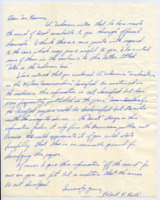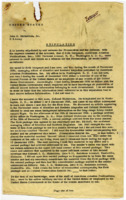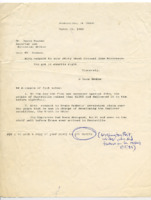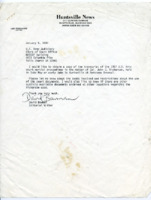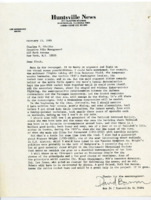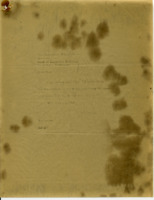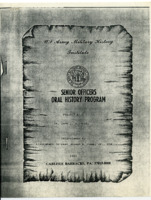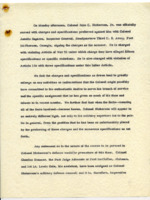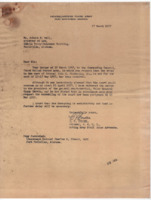
Browse Items (215 total)
Sort by:
-
Letter to Drew Pearson from Robert K. Bell.
This handwritten letter to Drew Pearson from Robert K. Bell details Colonel Nickerson's dealings with Pearson and the "Considerations on the Wilson Memorandum" that contained classified information. -
Stipulation of the testimony of Erik Bergaust.
Written testimony of Erik Bergaust, managing editor of Missiles and Rockets Magazine, as presented if he were "present in court". Signed by the defense counsel, the accused, and the trial counsel. -
Various correspondence with David Bowman from 1989 to 1991.
These letters to David Bowman, reporter and editorial writer, all pertain to Bowman's story about Colonel John Nickerson. The first letter includes foot notes and states that he sent a copy of the story to a Washington Post writer. The second letter contains additional information relating to the missile program that may be helpful for the story and a diagram of the original prototype for the Explorer I earth satellite. This set of letters also includes the original letter from David Bowman to Brig. Gen. Harold W. Nelson in which Bowman states he finally photocopied the published transcripts of Colonel Nickerson's court martial. Nelson's reponse follows thanking Bowman for sending the series on Colonel Nickerson. The final letter from Colonel Thomas W. Sweeney includes a working bibliography on the Nickerson case and invites him to visit the Military History Institute. -
Correspondence between David Bowman and Mary B. Dennis.
Bowman writes to the U.S. Army Judiciary Clerk of Court Office to request a copy of the transcript of the Nickerson court martial proceedings. Mary B. Dennis, Deputy Clerk of Court responds that a large portion is classified and asks if he wants that material reviewed towards declassification though it would be a lengthy process. She also guides him towards other "publicably available documents" regarding the case. The following letters from Dennis regards the review of the classified transcripts of the Nickerson case and more details about the record of the trial. Bowman's second letter includes a check to pay for the transcripts and the review of the classified material. Dennis writes several more letters regarding more classified prosection exhibits and that Bowman's request to review the classified material has been denied. The final letter is the memo that states that the review has been denied from Deputy Director Robert J. Monahan. -
Letter to Charles F. Pfeifer from David Bowman.
Bowman writes to Pfeifer about a "two-pager" that he wrote, detailing its contents. He also includes several other of his resume highlights including four novels, playscripts, and other things he has written. Bowman also includes that he is the president of the Tallulah Bankhead Society, a society that honors and celebrates a 1930s actress from Alabama. Bowman is appealing to Pfeifer, a creative film manager, about his recent work on the Nickerson case. -
Correspondence between Colonel John C. Nickerson, Jr. and Margaret C. Brownlow.
Brownlow writes to give Nickerson the name of someone that would be interested in his case, Ray Jenkins, who would eventually join Nickerson's defense counsel with Robert K. Bell, along with two others. Nickerson responds, thanking Brownlow for the information. He expresses concern over financially securing Jenkins for his defense but hopes that Brownlow could still arrange a meeting in Knoxville, Tennessee. The third letter is a rough draft of Nickerson's response. Brownlow's second letter responds that she was able to get in touch with Ray Jenkins and left him with materials to read on Nickerson's case. Brownlow states she would get back to Nickerson as soon as he says "yes". -
Letter to Ray H. Jenkins from Estes Kefauver and enclosed copies of letters.
Kefauver writes to Jenkins stating that he has enclosed the letter from the Department of the Army regarding the Nickerson case. The following letter addressed to Senator Kefauver is from Major General J. H. Michaelis. In it Michaelis writes that after consideration, the disclosure of certain documents is "too minimal to justify directing or advising the convening authority to drop the charges." He also writes that non-judicial punishment would be "legally objectionable" as Nickerson's offense is not minor. The last letter states the same regarding the dropping of the charges. -
"Senior Officers Oral History Program."
A project of the U.S. Army Military History Institute, this contains the interview of Dr. John L. McDaniel by Lieutenant Colonel Joseph W. Camp, Jr. from 1985. The interview is about the US Army's first satellite into space. McDaniel brings up the case of Colonel Nickerson relative to the interview. This document contains only the portion of the interview that mentions Colonel Nickerson. -
Statement from the defense counsel of Colonel John C. Nickerson, Jr.
This statement insists the charges and specifications against Colonel Nickerson "greatly enlarge on any activities or indiscretion that the Colonel might possibly have committed." The counsel states the Nickerson was simply acting out of enthusiasm to serve the Army. It states that Colonel Charles Zimmer and 1st Lt. Lewis Cole have been assigned to Nickerson's defense. -
Letter to Robert K. Bell from C. F. Cordes.
Cordes writes in response to the defense counsel's request to the Commanding General, Third United States Army, of the trials dates May 13-17, 1957. He confirms that the trials dates have been postponed to the 15th in accordance with their request.
